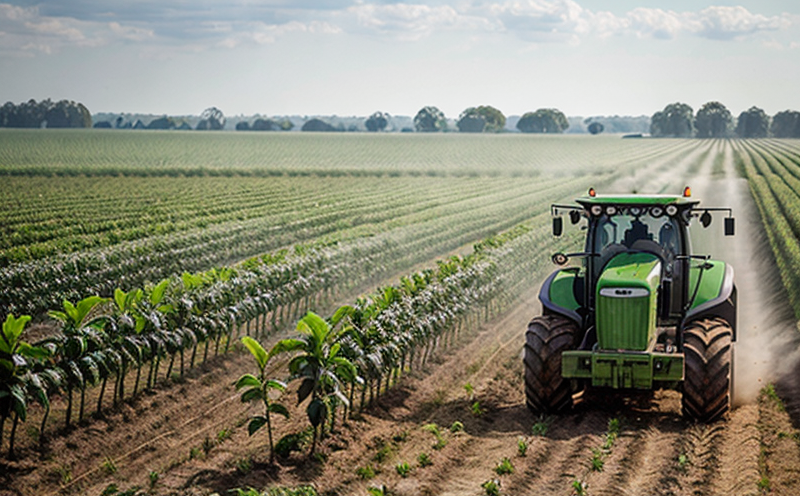ISO 6468 Pesticide Residue Testing in Agricultural Water
The process of pesticide residue testing in agricultural water is critical to ensuring food safety and environmental protection. ISO 6468, Pesticides—Determination of residues by gas chromatography, outlines the methodology for the analysis of pesticides in various matrices including water used for irrigation. This service ensures compliance with international standards and regulatory requirements.
Agricultural chemicals are essential tools for enhancing crop yields and controlling pests. However, their improper use can lead to contamination of agricultural waters, posing risks to human health and ecosystems. The purpose of ISO 6468 is to provide a standardized procedure that allows laboratories to accurately measure pesticide residues in water samples.
The testing process involves several steps: sample collection, preparation, analysis using gas chromatography (GC), and interpretation of results. Sample collection is crucial as it directly affects the accuracy of subsequent analyses. Proper sampling ensures representative concentrations of pesticides present in the water matrix.
Sample preparation typically includes concentration, extraction, and cleanup processes to remove interfering substances before analysis by GC. During this phase, laboratory personnel must follow strict protocols outlined in ISO 6468 to minimize contamination and ensure reliability.
The analytical method specified in ISO 6468 utilizes gas chromatography with either flame ionization detection (GC-FID) or electron capture detection (GC-ECD), depending on the type of pesticide being analyzed. GC-FID is suitable for detecting non-polar compounds, while GC-ECD provides sensitivity towards polar and halogenated compounds.
After acquiring peak signals from the detector, quantitative analysis is performed using calibration curves prepared with known concentrations of target pesticides. This approach allows accurate quantification of each detected pesticide in the sample.
The results obtained through ISO 6468 testing can inform farmers about potential overuse or misapplication of pesticides, which may lead to excessive residues in irrigation water. By adhering strictly to ISO standards, laboratories ensure consistent and reliable data that supports informed decisions regarding agricultural practices.
Compliance with ISO 6468 is mandatory for many countries worldwide due to its recognition by international organizations such as the World Health Organization (WHO) and Food and Agriculture Organization of the United Nations (FAO). Adherence ensures harmonized approaches across borders, promoting global trade in agricultural products.
In conclusion, implementing ISO 6468 pesticide residue testing in agricultural water is vital for maintaining both public health standards and sustainable farming methods. It helps prevent harmful effects on humans consuming contaminated produce as well as safeguarding natural resources against pollution caused by improper use of agrochemicals.
Quality and Reliability Assurance
- Standard Operating Procedures: Adherence to detailed SOPs ensures consistent sample handling, preparation, and analysis throughout the testing process.
- Certification of Analytical Methods: Regular validation tests confirm that analytical methods continue to meet specified performance criteria.
- Laboratory Accreditation: Our facility maintains ISO/IEC 17025 accreditation, signifying compliance with international standards for technical competence in testing and calibration laboratories.
The laboratory employs highly skilled technicians who undergo continuous training to stay updated on advancements within the field of pesticide residue analysis. Rigorous quality control measures are implemented at every stage of sample processing and measurement to minimize errors and maintain precision.
Our commitment to excellence extends beyond technical proficiency; we also invest in state-of-the-art equipment calibrated regularly according to manufacturer specifications. This investment guarantees accurate measurements essential for reliable results. Additionally, our team participates actively in inter-laboratory comparisons organized by recognized bodies like ISO or other relevant organizations ensuring consistency across different facilities.
In summary, through robust quality assurance practices and adherence to international standards such as ISO 6468, we provide clients with confidence that their pesticide residue tests are conducted accurately and reliably. Our dedication ensures compliance with global regulatory requirements while delivering actionable insights crucial for effective management of agricultural inputs.
International Acceptance and Recognition
- World Health Organization (WHO): ISO 6468 has been adopted by WHO, emphasizing its significance in establishing international guidelines for pesticide residue levels in foodstuffs and water supplies.
- Food and Agriculture Organization of the United Nations (FAO): FAO incorporates this standard into its recommendations for safe handling and use of pesticides to protect public health and environment.
- European Union: EU directives mandate member states to enforce compliance with ISO 6468 when conducting pesticide residue analyses in agricultural water intended for human consumption or ecosystem protection.
Besides these major international bodies, numerous national standards organizations have adopted ISO 6468 as a benchmark for their respective jurisdictions. For instance, Japan's Ministry of Agriculture, Forestry and Fisheries (MAFF) uses this standard to regulate pesticide usage in agriculture within its borders.
The widespread acceptance of ISO 6468 underscores its role in fostering harmonization among countries regarding pesticide residue limits set forth by regulatory authorities worldwide. By aligning with internationally accepted protocols like those prescribed in ISO 6468, laboratories contribute significantly towards ensuring uniformity and trustworthiness across diverse geographical regions.
Environmental and Sustainability Contributions
The significance of accurate pesticide residue testing cannot be overstated. Proper monitoring not only protects consumers from harmful contaminants but also safeguards ecosystems by preventing overexposure to toxic substances. By employing ISO 6468 methods, our laboratory plays a pivotal role in mitigating risks associated with improper pesticide application.
Our services help environmental agencies and regulatory bodies implement effective policies aimed at reducing pollution caused by agricultural runoff containing pesticide residues. Through precise measurement techniques provided via this standard, we assist stakeholders in making evidence-based decisions that promote sustainable farming practices.
In addition to supporting regulatory compliance, our expertise contributes positively to research initiatives focused on developing safer alternatives for pest management without compromising productivity. Collaboration with academic institutions and industry partners ensures that advancements in science and technology are integrated into routine testing procedures.
By participating in ongoing improvement projects based on feedback from clients and continuous review of current best practices, we remain at the forefront of innovation within our field. This proactive approach allows us to anticipate emerging trends related to environmental stewardship and contribute meaningfully towards achieving long-term ecological balance.





